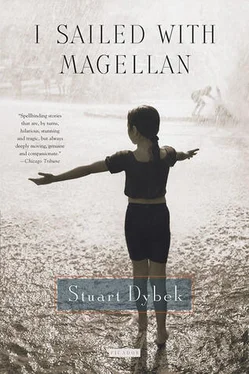Evenings, I’d head over to the cinder field under the lights at Harrison Park looking for a pickup softball game. It felt like my last summer for playing ball. I’d get back home after everyone was in bed, and then it would be time to set up my Smith-Corona at the kitchen table and get to work on the semester’s worth of term papers I had to finish before St. Augustine High would grant the diploma they’d withheld and set me free.
It felt vaguely disorienting to be sitting at the Smith-Corona that was supposed to have been my graduation present, typing, to the accompanying clack of summer insects, papers that had been due months earlier when I was still in high school.
I couldn’t recall those months back in winter without envisioning them as a private world opaque with frost and breath-steamed windows in which I wandered lost in dreams of Laurel Elaina Levanto. The temptation was to daydream about her now, except that the last time I’d seen her had been so humiliating it was painful to think about her. I’d awakened abruptly from my dream state just in time to tally up the damages: in the few months since I’d met Laurel, I’d managed to fail most of my subjects, mess up my college entrance tests, and lose whatever slim chance I had for a track scholarship. Fortunately, she had no idea.
She didn’t know that instead of memorizing Spanish verbs or writing a civics paper I had stayed up late at night working on songs about her that I never managed to finish, ballads I sounded out on the sax I’d inherited from my uncle Lefty and wrote down on music paper note by painstakingly tooted note. She didn’t know I lost races I should have won, coming slow motion out of the starting blocks, floating over the high hurdles in a self-induced fog, while the coach raced after me along the inside oval of the track yelling, “Get your head into it, Katzek!” Nor did she know how I’d wait in the cold just to board the Archer Avenue bus she rode to her dance lessons. If she wasn’t on the first bus, I’d get off at the next corner and wait for the next one. Sometimes, I’d have to board three or four of them before I timed it right. I must have had a reason, but looking back I no longer knew why I’d thought that meeting her had to continually seem like a coincidence, or fate.
It was on the Archer Avenue bus that I first saw her. She was wearing leg warmers and pinning up her hair, lifting the dark, silky weight of it in both hands in a way that exposed her neck and made me feel I’d seen something I shouldn’t have. Later, she’d tell me that Miss Lilli, her dance teacher, required her students to wear their hair up. I worked for weeks on a song called “Bus Girl,” and one of the few things I still felt thankful for was that I’d never mailed it to her, as I almost had any number of times.
The way your arms raise over your head
kinda knocks me out
kinda knocks me dead
And when you sweep your hair up
offa your neck
my heart starts pounding, hey, what the heck …
I tested the lyrics out in the Economy one night on Stosh and Angel — fortunately, I wrote them on a napkin rather than singing them aloud. My friends exploded into laughter, anyway.
“Try it this way,” Angel said, scribbling on a napkin.
When you sweep your hair up
offa the floor
it-a always makes-a me pound offa more.
“No,” Stosh said. “Better like this.” He grabbed my napkin and scratched out my lines so that the verse read:
When you sweep your hair up
my pecker thinks, Hey, aw, shucks!
How about it if we fucks?
I crushed the napkin, which made them laugh all the harder.
“I’m worried about you,” Angel said. “You’re getting carried away.”
“Yeah, wake up, Katman, before you’re in over your head,” Stosh said. “I mean, what the heck , I don’t know if you’re ready for an older woman.”
They were kidding, but it was true. I was seventeen, younger than they, and Laurel had graduated from high school the year before and was enrolled part-time at Loop Junior College. She worked as an organist at weddings and funerals. I couldn’t deny it: my still being in high school did have something to do with the way I was acting around her, which is probably why I suddenly told Stosh, “Fuck you,” and fired the balled-up napkin in his face, then stood up. We’d been sparring partners when we were both freshman lightweights on the boxing team, but I’d dropped boxing for track, and Stosh had gone on to win the CYO middleweight championship. He had a fierce temper that he’d learned to harness and could probably have mopped up the Economy with me, but he remained seated in the booth, holding his bowed head in disappointment.
Now, sitting before the typewriter in the middle of the night, my jaws grinding on Dexadrine, I listened to the 383 engine backfiring at stop signs as Stosh circled the neighborhood. Maybe he was high on some potion he’d concocted in the pharmacy, and probably he was grooving to Beethoven — he’d gone from Ray Charles and the blues to Beethoven with nothing in between. Then his tires would squeal and I’d hear him revving through what seemed like an infinite number of gears, playing the Merc like a virtuoso as he faded off into one of his exploratory drives toward the blast furnaces of South Chicago or north along the dark curve of the lake to the place we called Baha’i.
I was down to my last paper, a report on a book I’d chosen about a Frenchman named Marcel Libert, who, while still a college student, had trekked alone down the coast of Quintana Roo, discovering what he called “the lost world of the Mayas.” Marcel hiked along blazing beaches and hacked through jungle, coming upon overgrown ruins of temples and hidden villages with names that sounded like the cries of tropical birds: Xcalet, Yalcu, Xcalak.
I wanted a cry like that for a postmark on the letter I’d write to Laurel when I made it to Mexico.
Usually Stosh would stop by late to see how the typing was going. Ever since the beginning of summer, he’d been on a sleep fast. It was his contention that sleep was something They — with a capital T— had conditioned you to do ever since kindergarten nap time in order to keep you quiet. He claimed it could be cut back like any bad habit.
“It’s holy to fast from food, so why not sleep?” he argued. “Think about it, man, it’s a plot against us. For all practical purposes sleep is a rehearsal for being dead.”
“Sleep is the opiate of the people,” I agreed.
Stosh estimated that with the two of us conditioned to stay awake and driving nonstop we could make the border in three days.
“One drives while the other sacks out,” he figured.
“Save on motel bills,” I said.
“ Motel bills! Are you kidding, hombre? Spend money on motels when we can sleep in the car if we have to? What kind of bourgeois, gringo idea is that?”
“Maybe Angel will come, then there’d be another driver.”
“Yeah, don’t count on it. Angel’s doing the van Gogh,” Stosh said, making a sound like a tubercular old man hacking up a gob of phlegm, which was how we uttered van Gogh’s name after Angel corrected our pronunciation.
Angel Falcone, Stosh, and I had hung around together through high school, but Angel had been expelled in the middle of senior year, and we hadn’t seen much of him ever since he started taking classes at the Art Institute.
Stosh didn’t need to go to Mexico to sleep in his car. He’d been getting into fights with his father for the last year, and sometimes rather than go home he’d park the Merc behind a factory and sleep in the backseat. Some mornings, when I’d wake up to catch the Manpower truck, I’d find Stosh sacked out on the sagging musty couch on our back porch. I’d make us a couple of instant coffees to start the day.
Читать дальше












